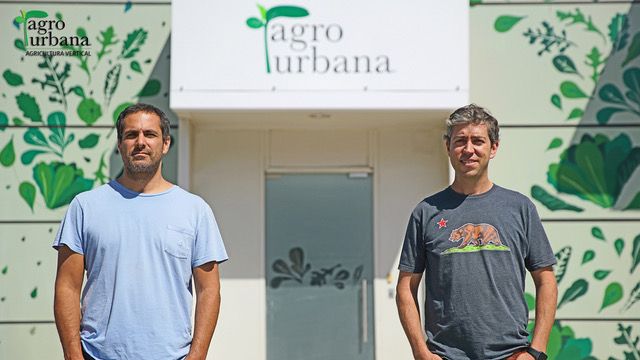As an agricultural format, vertical farming is still largely unheard of in Latin America. Pablo Bunster and Cristian Sjögren, founders of Chilean vertical ag startup AgroUrbana, are trying to change that by bringing their experience and expertise in the renewable energy sector to bear.
Bunster and Sjögren started AgroUrbana in 2018, launching what’s widely believed to be Latin America’s first large-scale vertical farm. Momentum has only increased since then, and recently, AgroUrbana closed a $4 million Series A funding round to expand on its vision of kickstarting vertical farming operations across the region.
The round was led by impact investment firm Kayyak Ventures. Other participants included the CLIN Fund managed by Chile Global Ventures, and family offices linked to the food, retail, financial, and real estate industries.
The new funding will go towards building AgroUrbana’s first large-scale vertical farming plant. The company currently operates a 3,000-square foot climate-controlled pilot facility in Santiago that grows lettuce varieties using hydroponics and precise spectrum lighting. The new facility will be a replication of the pilot plant – but 10 times bigger. It will increase AgroUrbana’s output by about twentyfold, according to the company.
Bunster and Sjögren tell AFN that AgroUrbana greens have been in supermarkets like Cencosud and Walmart for more than a year, in addition to sales channels through restaurants and catering. The company also operates a direct-to-consumer subscription box available via its website.
Powered by renewables
Technology-agnostic
“Proprietary” is word we hear more frequently these days in discussions around vertical farming. Companies like AeroFarms and Bowery have raised hundreds of millions of dollars, much of which they are pumping into what they claim to be proprietary technology systems to power their farms.
AgroUrbana is taking a different route; Bunster and Sjögren insist that they need a more off-the-shelf approach to technology when it comes to developing their vertical farms.
“We are very, very strict in thinking, rethinking, looking at the data, and taking decisions on where we put our money. That’s the difference [between] having $1.5 million to spend versus $300 million to spend,” says Sjögren. He notes that this decision to stick with existing technology solutions is directly influenced by their time spent in the renewables sector. Without naming specific companies, he says AgroUrbana does not want to “fall into the same mistakes” others in the renewables sector made. “Today you can see how those decisions affected who stays competitive and who’s not so competitive anymore.”
“We go to the hardware store where it makes sense,” says Bunster, adding that the company is “technology-agnostic” when it comes to the farms. “There’s a lot of what we need already readily available – you just need to know what you need and how to put it together. That’s what we’ve been doing for the last three years.”
Opportunities in Latin America
Bunster says that AgroUrbana sees Chile as a test market and have plans to eventually expand throughout Latin America, “where you have a high-concentration population in large cities.”
The likes of Sao Paolo, Bogota, Lima, and Mexico City also have huge numbers of hotels and restaurants that could become potential customers for the startup. Food deserts are present in many large Latin American cities, creating a need for better-quality produce closer to consumers.
AgroUrbana is also trialing new crops, such as strawberries. “The potential to keep adding product to our mix is huge, but first we have got to prove that we have a large-scale model that is profitable, and this is where we’re focusing,” Bunster says.





